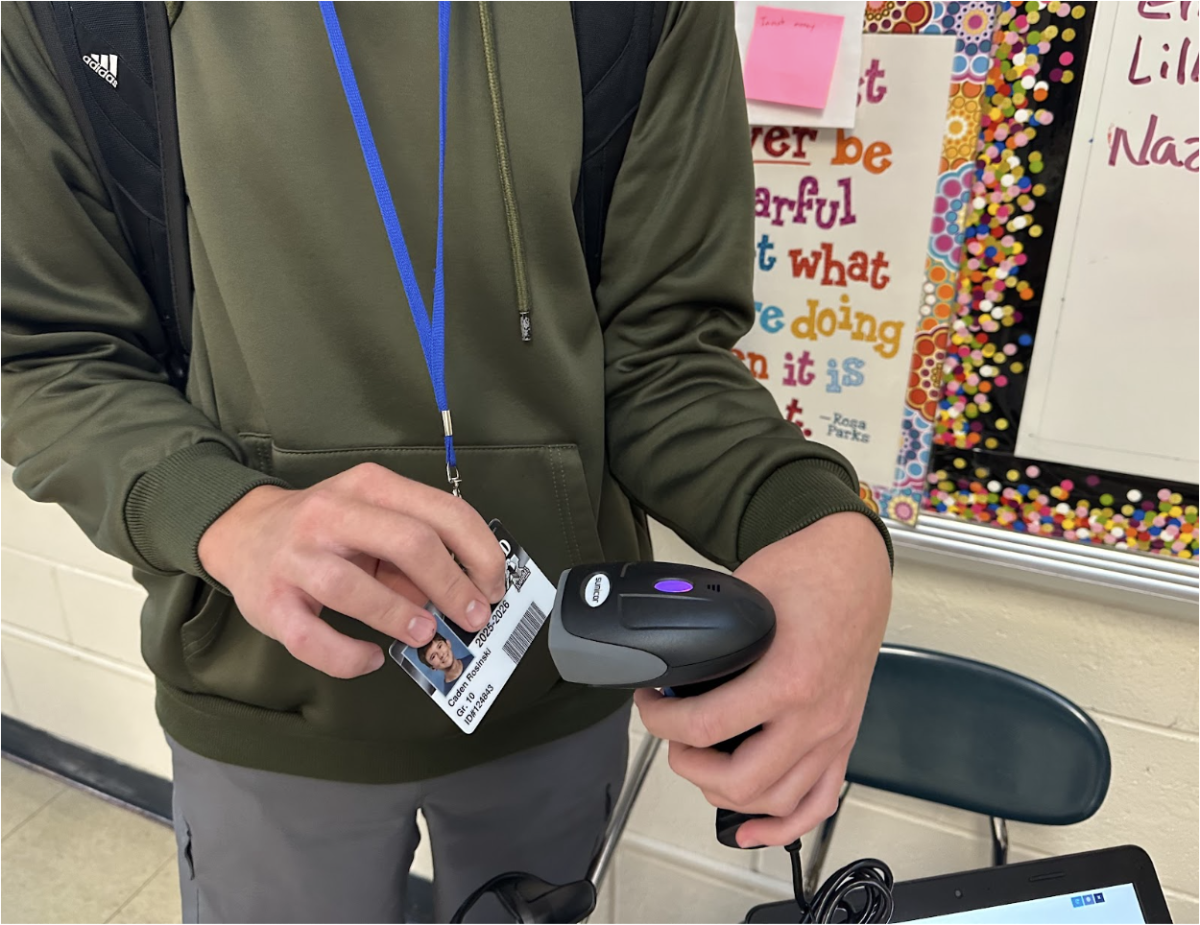Licensed clinical counselor Alexis “Lexie” Czarnecki begins to wake up for the day. Czarnecki makes her way to check on Maeve, her seven-year-old Staffordshire Terrier. She has been living with Czarenecki ever since the summer of 2017, during which she was trained to be a therapy dog and adopted.
As Czarnecki leaves for work, Maeve settles into the car, sporting a stylish bandana. The two of them make their way to Anchor Counseling, where Czarnecki has worked for nearly three years. Maeve starts her day by greeting clients of Czarnecki’s and mingling around the office. Clients smile as they see Maeve’s soft, silver fur and wagging tail welcoming them.
These are what typical days in Maeve’s life look like ever since she earned her American Kennel Club Canine Good Citizen certification to be a therapy dog.
Czarnecki and some of her colleagues first started the program that helped Maeve become a therapy dog in 2017. At the time, she was working for the Illinois Department of Juvenile Justice as a therapist. Czarnecki eventually connected with the Naperville Humane Society, and together they thought it would be a great idea to start a program working with shelter dogs and incarcerated adults or adolescents.
“We first selected a few of the teenagers, and they would help us work on training by socializing them, learning their quirks and understanding the dogs,” Czarnecki explained. “It definitely gave them some breaks away from the stress of a shelter, of course with the hopes of getting them adopted.”
As for therapy sessions, Czarnecki and Maeve have worked on special ways to support their clients. This includes training Maeve, teaching her a trick or just petting her and being in her presence. As every client is different, Czarnecki has a unique approach to bring comfort to each client, with the support of Maeve.
“A lot of people struggle in life, and a handful of them end up coming to mental health professionals because they feel judged or not listened to,” Czarnecki noted. “But that’s the beauty of animals. They have no judgments, and they don’t always have something to say back to you.”
Another way that Czarnecki helps her clients is by focusing on their care towards Maeve. As many of her clients struggle with self-esteem related issues, it is helpful to look at their confidence from the perspective of taking care of Maeve, which compares to how they take care of themselves.
“Something that I got to witness is the motivation to be responsible for somebody besides ourselves,” Czarnecki noticed. “It makes us, as humans, feel a sense of pride and even helps with increasing our confidence.”
Although in Czarnecki’s experience therapy dogs were implemented in a Juvenile Facility and Counseling office, therapy dogs are used all around the country. According to the Centers for Disease Control and Prevention (CDC), “Over 50,000 therapy dogs in the United States provide emotional support to people in hospitals, retirement homes, schools and airports.”
Specifically at Kaneland High School, the Lutheran Community Church Comfort Dogs visit regularly and allow students to interact with the dogs. One of the dogs, Eunice, is a nine-year-old Golden Retriever whose calm, gentle demeanor keeps KHS students eager to come up and pet her. Shar Ferran, her handler, is certain that all high school students could benefit from being in the presence of a therapy dog.
“Just look,” Ferran said as she pointed to Eunice. “People come up, people smile, they sit down and scratch, they love.”
The Lutheran Community Church Comfort Dogs first launched their program in 2008, now successfully building a community of clients and donors. According to their website, “LCC K-9 Comfort Dogs are working animals, trained to interact with people of all ages and circumstances who are suffering and in need.”
With the financial support from donors, LCC is able to own 130 Golden Retrievers throughout 27 different states. With the goal of having a national outreach, the K-9 dogs are employed to provide comfort to their first responders, volunteers and anyone else who needs help.
Aside from licensed therapy dogs, normal pets in homes can provide additional support for their owners. Most people, including myself, have found themselves adopting a dog to be their companion when they feel some sort of emptiness in their own lives. According to the Washington Post, in 2020 alone, 23 million Americans adopted a pet while the pandemic was occurring. Sophomore Chloe Sullivan can relate, as she adopted Millie, a Labradoodle, in 2021 after feeling a sense of loneliness during the pandemic.
“When the pandemic was happening, my family and I liked to take Millie on plenty of W-A-L-K-S,” Sullivan laughed as Millie looked at her eagerly. “I feel like we got Millie at the perfect time, and she helped us get out of our house way more.”
Unlike Millie, plenty of other dogs are older and less active. Even if your dog is in its senior stage, they still have many benefits for your mental health. Kaneland receptionist Jennifer Biddle owns an 11-year-old French Bulldog whom she lovingly calls “very lazy,” as he loves to relax with her family.
“We like watching movies and reading with him. He just loves sitting next to us,” Biddle said. “He has a great personality, and he always puts a smile on our faces.”
Spending time with your dog not only has the potential to ease your stress, but it can also increase your time spent outdoors. According to the National Library of Medicine, a study taken over the course of 10 months proved that new dog owners were more likely to take walks than new cat owners and non-pet owners. English teacher Rachel Giles owns a six-year-old German Shepherd who requires lots of time spent on walks and playing outside.
“Scout makes me get outside more, for sure,” Giles said. “She’s super high-drive, so we have to be doing stuff with her all the time.”
As dogs are very active animals, specifically in their younger ages, they require being walked and played with daily, which is a great way to get fresh air. Kaneland social worker Alexandra Cox, who grew up with dogs, agrees that everybody can benefit from spending time outside with their pet.
“The big thing with dogs is that they get you outside,” Cox said. “Whether you want to go outside or not, you have to take them out.”
Whether you own a dog or not, they are an amazing outlet for stress relief and managing mental health in our everyday lives. Simple things like the wag of a tail, a calming walk or an affectionate look from a dog can make all the difference.
Maeve, Eunice and all of the other canine companions are collectively working towards providing support for people in schools, hospitals, counseling offices, retirement homes and more. The training and work that these dogs put into supporting others ends up putting a smile on everybody’s face and leading them towards a more positive future.










